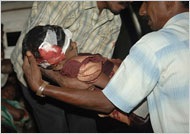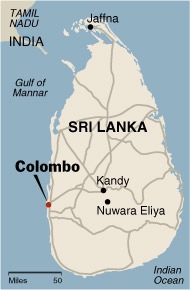 The frustrated shopkeeper, a middle-aged, ethnic Tamil man, surreptitiously dug into a stack of cricket shirts and pulled out a plastic bag. Inside was yet another bag that held a folded-up Tamil-language newspaper — not forbidden, he said, but certain to raise suspicions among his Sinhalese neighbours and the authorities.
The frustrated shopkeeper, a middle-aged, ethnic Tamil man, surreptitiously dug into a stack of cricket shirts and pulled out a plastic bag. Inside was yet another bag that held a folded-up Tamil-language newspaper — not forbidden, he said, but certain to raise suspicions among his Sinhalese neighbours and the authorities.
“This government, no one can speak against them,” said the shopkeeper, who was too fearful to give his name. “If I talk, maybe you will not see me here tomorrow. I can disappear.”
After more than 25 years of bloodletting, the government’s war with ethnic Tamil separatists may be in its final stages in the north of the country. This week, President Mahinda Rajapaksa predicted that the war was just days from ending, and one of his senior ministers said that the military campaign was in its “mopping up” stages.
But even with the end of conventional warfare, anger and resentment are likely to linger for many Tamils in the north — anger at what they call decades of official marginalization, and resentment over what they say are discriminatory education policies and the suppression of the Tamil language by administrations dominated by the Sinhalese Buddhist majority.
Until those issues are addressed, and unless the war ends on equitable terms, many people here — Tamils and Sinhalese alike — say they fear that the war will not so much end as change form, as a new generation of Tamils comes of age discontented.
“The government newspapers are just telling lies, but our young Tamil boys are knowing about all the people being killed by the army in the north,” the shopkeeper said. “These boys are becoming young lions. They will grow up to be lions. You will see.”
The Sri Lankan military added another victory on Friday to its startling string of battlefield successes, but there was little sign of relief for the tens of thousands of civilians trapped in rebel-held territory.
The military said it captured the base that housed the security detail of Velupillai Prabhakaran, the founder and leader of the separatist rebel movement, who was believed to be leading the last stand against the government forces.
Brig. Udaya Nanayakkara, a spokesman for the Sri Lankan military, said rebels had fled the base during the attack, and none had been captured.
Brigadier Nanayakkara said he could not put a time frame on the capture of the remaining rebel-held territory, which the Defense Ministry says has been whittled down to about 60 square miles.
“If there were no civilians, it would be a matter of days,” he said. “We want to finish it off as soon as possible, hopefully within a couple of weeks.”
 The government’s claims about the state of the fighting are difficult to assess because of restrictions on the access of independent journalists to the war zone. But with the battle clearly going in its favor, the government is now apparently determined to vanquish the insurgents of the Liberation Tigers of Tamil Eelam, also known as the Tamil Tigers, once and for all.
The government’s claims about the state of the fighting are difficult to assess because of restrictions on the access of independent journalists to the war zone. But with the battle clearly going in its favor, the government is now apparently determined to vanquish the insurgents of the Liberation Tigers of Tamil Eelam, also known as the Tamil Tigers, once and for all.
The rebels are backed into a small wedge of jungle along Sri Lanka’s northeastern coast, having seen their strongholds steadily toppled. The defense secretary rejected calls from the United States, Britain, Japan and the European Union for a negotiated truce; he said the military would continue to press the fight until the Tamil Tigers unconditionally surrendered.
What happens after that is on the minds of many Tamils and others, who fear the insurgents will simply shift from conventional warfare to guerrilla and terrorist tactics, like urban suicide bombings, something they have used before, even in Colombo, the capital.
Today, grim-faced soldiers stand at posts on nearly every block in the center of Colombo, checking faces, IDs and anything that seems at all out of the ordinary. And that often means checking anyone who looks to be an ethnic Tamil.
Even if the rebels are defeated, the security lockdown, and the fear and resentment it engenders, is almost certain to continue, people here say.
“These problems won’t be sorted unless there’s a fair resolution after the war,” said S. Thiayaraja, a Tamil businessman in the mountain resort town of Nuwara Eliya.
He said such a resolution would have to include government-financed development of schools, infrastructure, housing in the Tamil areas of the north, as well as some political autonomy with more Tamils being accepted into the military, the police and the civil service.
“It also won’t be sorted until Prabhakaran is found,” Mr. Thiayaraja said.
One report from the Defense Ministry also said security forces had found a training camp for suicide bombers that included the room where the bombers would have their going-away “final dinner of death” with Mr. Prabhakaran.
Some say Mr. Prabhakaran is still at the head of the rebel forces, ready to fight to the end. But there are many other theories on his whereabouts, from seeking sanctuary on a relative’s ship to hiding in Malaysia. Mr. Prabhakaran and the Tamil Tigers began fighting for a separate Tamil homeland in 1983, with the group’s first assault coming in an ambush of government troops. When subsequent anti-Tamil riots left hundreds dead, the battle was fully joined.
(For updates you can share with your friends, follow TNN on Facebook and Twitter )
